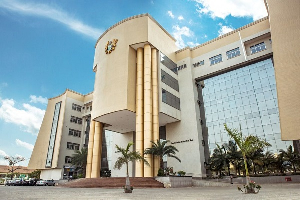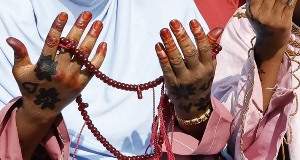– Please Tell Me
Now that the die is cast, there is no turning back. God through His vessel, ace investigative journalist Anas Aremeyaw Anas, has officially internationally and to the amazement of all and sundry, exposed the stinking corruption within the Ghana judiciary; masterminded and spearheaded by some judges who lack demonstrable integrity. These judges have been caught red-handed on recorded video tapes compromising the ethics of their law profession – accepting financial inducements, goats and other forms of bribe. Shame on them! Prosecute them. Sack them. Jail them if they are found to have breached the laws of which they are the custodians.
When the judges begin to learn to be fair and firm with the delivery of justice, ensuring verdict is always delivered in favour of the party (plaintiff or defendant) that produces credible documentary evidence coupled with facts and evidence to be gathered in court, Ghana will surely awake from her scarily ruinous or vegetative socio-politico-economic comatose in which she finds herself. This is why the judges caught spiralled into corruption, indirectly encouraging the perpetration of various acts of crime by whoever has the guts to bribe them, should be severely dealt with.
Here is another group of judges who have not been caught taking bribes but probably heard of involving themselves in such activities, or are found to have failed to deliver fair judgments. How do we treat such judges? The following three cases will help the reading public tell how such judges are to be categorised – corrupt or not corrupt, guilty of an offence or not guilty of any offence, etc.
Corruption is defined as "dishonestly using your position or power to get an advantage, especially for money". Corruption has taken place whenever you abuse your position with intent to help yourself or your cronies or your favourites to gain advantage over others in what is "whom you know but not what you know" kind of nonsense.
In the first case that has to do with the on-going Kumawuman chieftaincy wrangling, one Justice Paul K. Richardson, in the face of overwhelmingly credible video-captured evidence, provision of documents and citation of Constitutional articles pointing to the breach of law by Kumawuhemaa, Asantehene Otumfuo Osei Tutu II, Asanteman Council and Dr Yaw Sarfo, coupled with the pendency of injunction against Kumawuhemaa and Dr Yaw Sarfo etc., did the unthinkable. He refused to play the video cassette. He did not consider the merits and demerits of the case, but simply threw out the case while at the same time ordering Kumawuhemaa to go and proceed with her intentions of enstooling Dr Yaw Sarfo as Kumawuhene.
In any court of law presided over by judges of integrity, the evidence submitted to court is subjected to the tests of credibility, permissibility and acceptability. When it passes the tests, the judge is under obligation to use it. My privately conducted search turned out that video-recorded evidence is credible, acceptable and permitted in Ghana courts. How come then the unusual verdict delivered by the judge?
Check YouTube for the evidence under the title, "Asantehene involves in corruption". Additionally, check the following link for the relevant laws highlighting Kumawuhemaa's attitude and its consequence.
http://www.ghanaweb.com/GhanaHomePage/features/RE-Asantehene-is-the-Overlord-of-Asanteman-338032
Did the judge do a good job? Was he fair? Did he act professionally? Could he have had his palm greased with dollar or Cedi wads?
There was another judge who adjudicated on a dispute involving farmland. This took place in Kumawu in around 2006. The late Kumawuhene Barimah Asumadu Sakyi II sold or leased a 200-acre farmland to me. Hardly had I started to till the land when some faceless individuals emerged from nowhere to claim ownership of the land. I will only discuss in brief where two judges proved themselves either incompetent or corrupt.
An old lady of about 85 years old at the time (in 2006), now deceased but hailed from Abura near Antoa in the Ashanti region, whom I once had compassioned on, turned my leniency to be my weakness. She took my caretaker who once worked for her to Kumawu Court. She was claiming part of my land as hers but met resistance from the caretaker with whom they were holding grudge against one another.
After about three years dragging the case through court with the usual unnecessary, but incessant adjournments, the judge delivered his verdict. I had privately advised against the caretaker going to court as I had no interest whatsoever in the case. I had, and still have, the necessary legal documents, maps, indenture etc. entitling me to the ownership of the land. In addition to these documents presented to the court, the judge requested both litigants to go to Kumawuhene Barimah Asumadu Sakyi II to obtain letters from him stating who among the two the rightful owner of the land is. Barimah wrote the letter specifying in black and white that I, Rockson Adofo, is the owner and that he does not know the woman from Abura.
The letter was delivered to the court. However, the judge in his final judgment found my caretaker guilty. He said, "You are not the owner of the farm/farmland. It is not your responsibility, being only a caretaker, to take on this court case but the owner's hence you are guilty". He awarded costs against him, directed the woman to go and take as much land as she felt was hers.
What a travesty of justice! The old lady did not initiate the court case against me but rather the caretaker who once used to work for her before they fell out. She was the plaintiff while my caretaker was the defendant in the case. Why did the old lady specifically sue him but not me, knowing me personally and also very well? If the wrong person had been sued, who sued him and who should subsequently be declared guilty in the end? Is it the one who sued, or the caretaker who was sued?
People will get the full picture and better understanding when I explain in detail how I had compassion on both the woman and the caretaker and how I came to know them. With time, I shall tell the full story. If I had listened to my mum, may her soul rest in perfect peace, this would not have happened.
Last but not the least; another judge has left sour taste in my mouth with his judgment involving another claimant. This second claimant says a large portion of my land is his. We have for almost the past ten years locked horns in High Court litigations. Same as the old lady, this person has not even a sheet of toilet roll as a documentary evidence to his claim of ownership to the land. As usual, the judge ordered to see all my proofs pertaining to my title of ownership to the land which I complied. I presented them to the court.
The facts and evidence gathered in court all went in my favour, from what I heard. However, in the end, I heard that the judge, who has now proceeded on retirement after the case, had his palm greased with "something" by the plaintiff. The plaintiff's relatives abroad contributed money to induce the judge to declare verdict in their favour, it is alleged.
I have said to myself NEVER shall I bribe any judge regardless the nature of a case and its outcome.
Look how the judge declared his verdict in favour of the plaintiff who has not even a sheet of toilet roll to prove his title of ownership to the land. He directed them to go and take their portion of the land from the 200-acre farmland/farm saying, the land does not after all belong to Kumawuhene but to Yawsohene (Odikro).
It must be noted that:
1. The judge did not specify how many acres of land are to be taken by the plaintiff from the total acreage as mentioned above. A judge of integrity would have been clear on the acres that belong to the plaintiff if indeed anything belongs to him.
2. The judge in haste to proceed on retirement with his palm stickily greased with some Euros or Cedis wads, declared that the land does not belong to Kumawuman (Kumawuhene) but to Yawso (Yawsohene - an "Odikro" or sub-chief in English). This was the crux of his judgment in favour of the plaintiff.
It is very true the saying, "more haste less speed". The judge in rush for a reason or the other, probably to proceed on retirement in peace to quietly enjoy his money, did not realise that Ashanti lands were demarcated and mapped by then Chief Commissioner of Ashanti, Sir Francis Fuller, in the Gold Coast era and decreed that the land is the property of the divisional chiefs occupying them. Divisional chiefs are "Amanhene" but not "Adikoro" (sub-chiefs). Is Yawsohene an "Omanhene" or "Odikro?" This is the catch. The judge was trying to be smart but God is Smarter than him.
Are these judges who seem not to deliver judgments based on facts and evidence also corrupt that they can be held culpable for their untoward actions? I shall strike at the right time. I shall explain everything in detail, mentioning their names when the time comes.
Rockson Adofo
Opinions of Friday, 25 September 2015
Columnist: Adofo, Rockson













